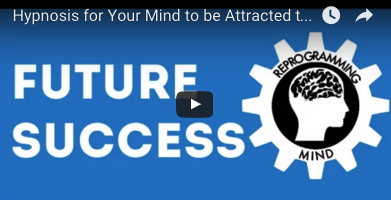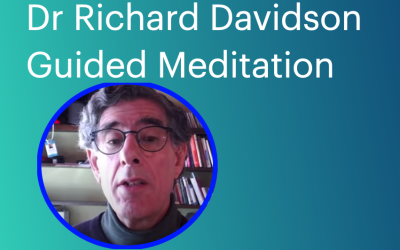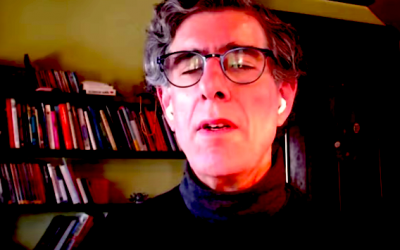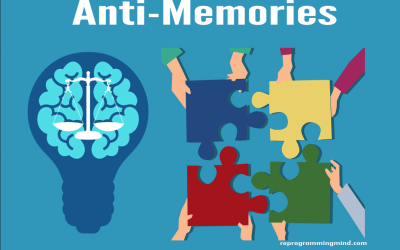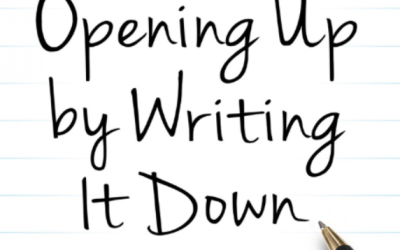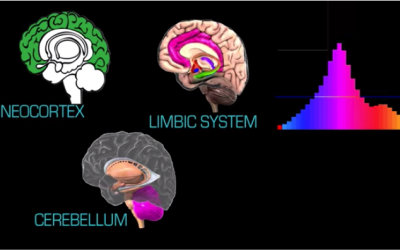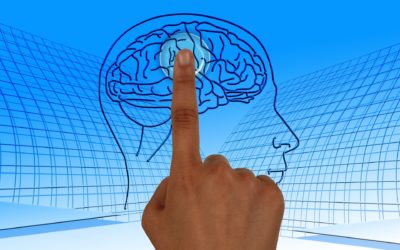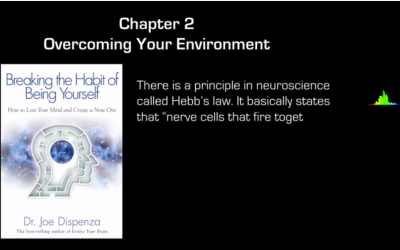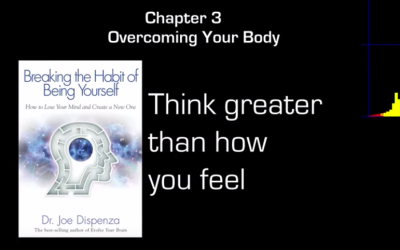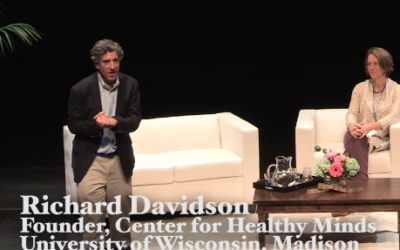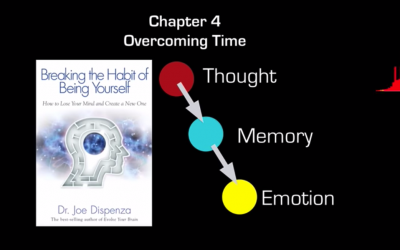Dr. Richard Davidson, a neuroscientist from the University of Wisconsin in Madison, and Dr. Sara Lazar, a neuroscientist based out of Massachusetts General Hospital and the Harvard Medical School gives an interview on his findings with meditation and its effects on the brain.
The following interview has been edited and condensed for clarity.
Host Bob Macdonald: Dr. Davidson, what was the most striking thing you found when you studied the meditation experts the Tibetan Buddhist monks?
Richard Davidson: Probably the most striking thing was in terms of the scientific findings was the presence of these very high amplitude gamma oscillations that occurred in the meditation period when they were meditating, but also were very prominent in their so-called baseline state. And I should say that these are if you will professional meditators. These are people who have an average of about 34,000 hours of lifetime practice and listeners can go do the arithmetic at home. But that's a pretty big number.
BM: What was going on in their brains that's different from what would be going on in say my brain?
RD: One of the important characteristics of these long term meditators if you will is that the distinction between the state of meditation in their ordinary state if you will is blurred.
This is the what we think of as the transition from a state into a trait. That is, it becomes an enduring characteristic of their minds and brains, rather than something transient that occurs only when they practice meditation.
Dr. Sara Lazar: Well we looked at brain structure and what we found is that there's several brain regions where there is more gray matter in the long term meditators compared to non-meditators. And as Dr. Davidson said that when you start meditating regularly that there is a shift that there's a blur between your meditation state and your everyday state.
And so we're interpreting these differences in gray matter to reflect that. That this is perhaps why and how you can get these shifts you're not meditation state looks more like your meditation state - the brain actually starts to rewire itself. And that's what we saw evidence for in these long term meditators.

SL: The most pronounced changes were in the insula. This is an area that's involved in integrating sensory experiences with cognitive thinking. And so you could think of that, sort of in a very loose hand-waving sort of way, as the mind body sort of area. We also found areas in the front of the brain which is an area involved in rational thinking and decision making.
BM: Dr. Lazar, we hear a lot about enlightenment, if meditation really does work. From a scientific point of view what is that possible do you see it?
SL: I think it's important to make a distinction between people who meditate for 20, 30, 40 minutes a day for stress reduction and people who are really committed to obtaining enlightenment. As Dr. Davidson pointed out, you could think of those monks as being professional meditators. And so I think that it really takes that sort of commitment -- full time commitment for many, many years -- in order to reach enlightenment. For the average Joe who's just meditating for stress reduction that that's not really a realistic goal.
BM: Dr. Davidson, you say that meditation could make people feel worse. What do you mean by that?
RD: It can exacerbate depression, it can precipitate psychosis. It can do some harm. It's really important for an individual who may be predisposed and have a history of some psychiatric difficulty to engage in meditation practice under the guidance of a teacher who is both a mental health practitioner as well as a meditation teacher.
And often if a person I think is doing worse it could very well be because the nature of the instruction is not as attuned to where the person is as it might be.
BM: Dr. Lazar, how do you feel about people going to a phone app for their guided meditations without a teacher present?
SL: The apps are like a book or any other recording or any other things that have existed in the past. I think they're great as a supplement but I don't think anything compares to having a teacher that you can talk to about your experience.
Hypnosis Audio: Mindset for Success
Some people fear success. This audio...
Can Meditation and Yoga Reverse DNA and Increase Health Benefits?
Mind-body interventions (MBIs) such as meditation, yoga and Tai Chi don’t simply relax us; they can ‘reverse’ the molecular reactions in our DNA which cause ill-health and depression.
Best 7 Anti-Anxiety Meditations
With all the uncertainty with the changing of presidents, laws, and increasing impacts of the coronavirus, it’s natural for our bodies to occasionally go into flight, fight or freeze mode and this can result in having our anxiety levels cranked up, but it doesn’t always have to be this way. Anxiety can be reduced and it can be done with meditation, not medication.
Dr. Richard Davidson Guided Self Meditation – and Mental Well Being Toolkit
Davidson is best known for his groundbreaking work studying emotion and the brain. He is a highly sought after expert and speaker, leading conversations on well-being on international stages such as the World Economic Forum, where he serves on the Global Council on Mental Health. Time Magazine named Davidson one of “The 100 Most Influential People in the World” in 2006.
Personalities that Thrive in Isolation and What We Can All Learn from Time Alone
Research shows people who are emotionally stable, self-reliant and autonomous, goal-oriented, friendly, patient and open tend to cope better in conditions of extreme isolation. In particular, it has been observed that “‘sociable [read agreeable] introverts’ – who enjoy, but do not need, social interaction – seem optimally suited for capsule living”.
How to Start Rewiring Your Own Brain to Become Resilient
Challenges to our need for satisfaction are frequently experienced as frustration, disappointment, drivenness, addiction, blahness, or boredom. Feeling thankful, awestruck, or already contented are well-matched to these issues. Challenges to connection can be experienced as loneliness, resentment, or inadequacy—and feeling either caring or cared about is a wonderful relief, since love is love whether it is flowing in or out.
6 Minute Meditation by Richard Davidson
Richie Davidson has done a short meditation online that you might find useful. The purpose of this meditation is to give beginners a way to ease anxiety and reduce stress, especially during the pandemic, for coping with isolation or physical distancing.
Experience True Tranquility: The Meditation Chair that Has Your Back
Just as a runner needs quality shoes, a meditator benefits immensely from proper seating. Here’s why:
Posture & Alignment: Maintaining a correct posture during meditation aids in proper breathing and energy flow.
Duration: Physical discomfort can cut short a meditation session. A supportive chair extends the time spent in practice.
Deeper Meditation: Physical comfort can lead to deeper, more profound meditation experiences.
Radical Remission: Surviving Cancer Against All Odds Book Review
Dr Kelly Turner defines it as any cancer remission that is statistically unexpected, and those statistics vary depending on the cancer type, stage, and medical treatment received.
To be more specific, a radical remission occurs whenever:
• a person’s cancer goes away without using any conventional medicine; or
• a cancer patient tries conventional medicine, but the cancer does not go into remission, so he or she switches to alternative methods of healing, which do lead to a remission; or
• a cancer patient uses conventional medicine and alternative healing methods at the same time in order to outlive a statistically dire prognosis (i.e., any cancer with a less than 25 percent chance of five-year survival
Memory Manipulation for PTSD, Addiction and OCD with Neuroscientist Karim Nader
One of the neuroscientists in the landmark study about memory reconsolidation is Karim Nader, an Associate Professor at McGill University in Montreal who also happened to have won an award for his work on memory research. He gave an interview about memory manipulation, the theory of reconsolidation, and describes how it might be used to treat anxiety disorders and post traumatic stress disorder, drug addiction, obsessive compulsive disorder and more.
Auto Draft
While online psychology courses offer many advantages, such as flexibility and convenience, it can be challenging to determine what is the best online psychology course. With so many options available, it is essential to take the time to evaluate the course and make an informed decision.
Book Review: The Amazing Brain Cells That Link Mind and Body
Researchers have found, for instance, that people suffering from depression have elevated levels of activated microglia and that, as Nakazawa puts it, “the longer that depression went untreated, the more havoc microglia wreaked in the brain.”
Anti-memories Could Revolutionize Neuroscience
At the same time that a memory is created, an “anti-memory” is also spawned – that is, connections between neurons are made that provide the exact opposite pattern of electrical activity to those forming the original memory. Scientists believe that this helps maintain the balance of electrical activity in the brain.
What is Post Traumatic Growth?
Post-traumatic growth (PTG) refers to...
Why Do We Dwell on Past Memories?
Many of us enjoy writing in a diary,...
Why Is Back Support Essential When Meditating?
However, one aspect of meditation practice that often gets overshadowed is the importance of proper back support during meditation. This seemingly small detail can significantly impact the quality of one’s meditation. Let’s delve into why back support is absolutely essential when meditating.
Six Apps for Therapy as Alternatives to Talkspace
The service and experience might be fine but if you’re not quite feeling it and are looking for alternatives to the Talkspace Therapy App, here are six of the best therapy apps to consider.
To Boost Your Self-Esteem, Write About Chapters of Your Life
It’s been shown that people who tell more positive stories, including referring to more instances of personal redemption, tend to enjoy higher self-esteem and greater ‘self-concept clarity’ (the confidence and lucidity in how you see yourself).
Are You a Narcissist? Take the Narcissist Quiz to Find Out!
Some individuals think they are great...
How Come Addictions are Difficult to Overcome?
Addictions are a tough nut to...
Best Show on Netflix – The Mind, Explained – Review
Netflix is my new friend after the...
Is Expressive Writing a Beneficial Form of Self Therapy?
Dr James Pennebaker and Dr Joshua Smyth share their insights on how expressive writing eases emotional pain.
Bio-Hack How to Get Your Date to Fall in Love
Having good looks, charm and being...
Breaking the Habit of Being Yourself Review Chapter 6
In this post we are reviewing chapter...
After Researching 71,173 People, Here are Some Benefits of Optimism
When individuals were compared based on their initial levels of optimism, the researchers found that the most optimistic men and women demonstrated, on average, an 11 to 15 percent longer lifespan, and had 50-70 percent greater odds of reaching 85 years old compared to the least optimistic groups.
Why Speaking to Yourself in the Third Person Makes You Wiser
We credit Socrates with the insight...
How to Meditate for Beginners
Do you know how to meditate?...
50 Ways To Kill Brain Cells (part two)
18) Post traumatic stress disorder —...
Brian Tracy Goal Achievement System Review.
In this post we're taking a look at a...
Dr Joe Dispenza Breaking the Habit of Being Yourself Review Chapter 2
Chapter two in Dr. Joe Dispenza's...
Joe Dispenza Breaking the Habit of Being Yourself – Review Chapter 3
Breaking the Habit of Being...
Harvard Neuroscientist ‘Well Being is a Skill’
“Well-being is fundamentally no different than learning to play the cello.” This is the conclusion that neuroscientist Richard Davidson at the Center for Healthy Minds at the University of Wisconsin-Madison and his colleagues have declared.
Breaking the Habit of Being Yourself – Review Chapter 4 – Overcoming Time
Review of Chapter 4 Overcoming Time,...

